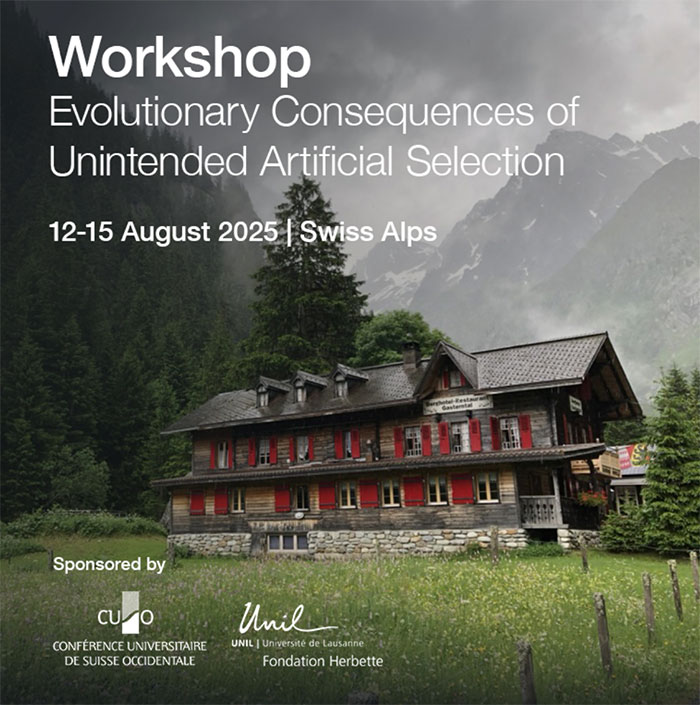Detailed information about the course
| Title | The evolutionary consequences of unintended artificial selection on population viability |
||
| Dates | Aug 12-15, 2025 |
||
| Lang |
|
||
| Responsible | Claus Wedekind |
||
| Organizer(s) | |||
| Speakers | - Shawn Narum (University of Idaho & Columbia River Inter-Tribal Fish Commission, USA) - Yngvild Vindenes (University of Oslo, Norway) - Madhav (Maddy) Thakur (University of Bern, Switzerland) - Tamás Székely (University of Bath, UK) - Jérôme Goudet (University of Lausanne, Switzerland) - Claus Wedekind (University of Lausanne, Switzerland)
|
||
| Description |
Wild populations are shaped by natural selection, sexual selection, and (mostly unintended) artificial selection. The latter include, for example, a decline of the mean breeding value for horn size in response to trophy hunting, or reduced individual growth rates in response to size-selective fishing. Previous research in this context has concentrated on the evolutionary responses in the specific traits that are under selection. The effects of unintended artificial selection on population fitness are still largely unclear. Artificially changed selection regimes can increase the genetic load of natural populations, either by directly selecting against individuals of high breeding value for fitness (e.g. if fast growth is an indicator of low genetic load), or by relaxing natural and sexual selection and hence reducing purifying selection (e.g. in supportive breeding programs). We will discuss such problems in the context of current environmental changes and the potential of rapid evolution. |
||
| Program | From Tuesday noon to Friday noon. |
||
| Location |
Kandersteg-Selden |
||
| Map | |||
| Information | The workshop is open to PhD students, postgraduate students, postdocs and academics from all universities worldwide, but the number of participants is limited.
When? 12-13-14-15 August 2025
Where? Berghotel Gasterntal in the remote valley "Gasterntal" in Kandersteg-Selden
More information: here |
||
| Expenses | Fees:
The registration fees cover full board from Tuesday evening to Friday morning (3 nights) and lunch boxes for Tuesday and Friday noon.
Travel: PhD students of the DPEE are eligible for the reimbursement of incurred travel expenses by train (half-fare card, 2nd class). Reimbursement online via MyCUSO after the activity is over.
|
||
| Registration | CUSO PhD students: through your MyCUSO account. External participants: through this page. Registration deadline : July 1, 2025 --> extended to July 20, 2025
|
||
| Places | 36 |
||
| Deadline for registration | 10.08.2025 | ||
| Sponsors | - CUSO - Herbette Foundation
|



